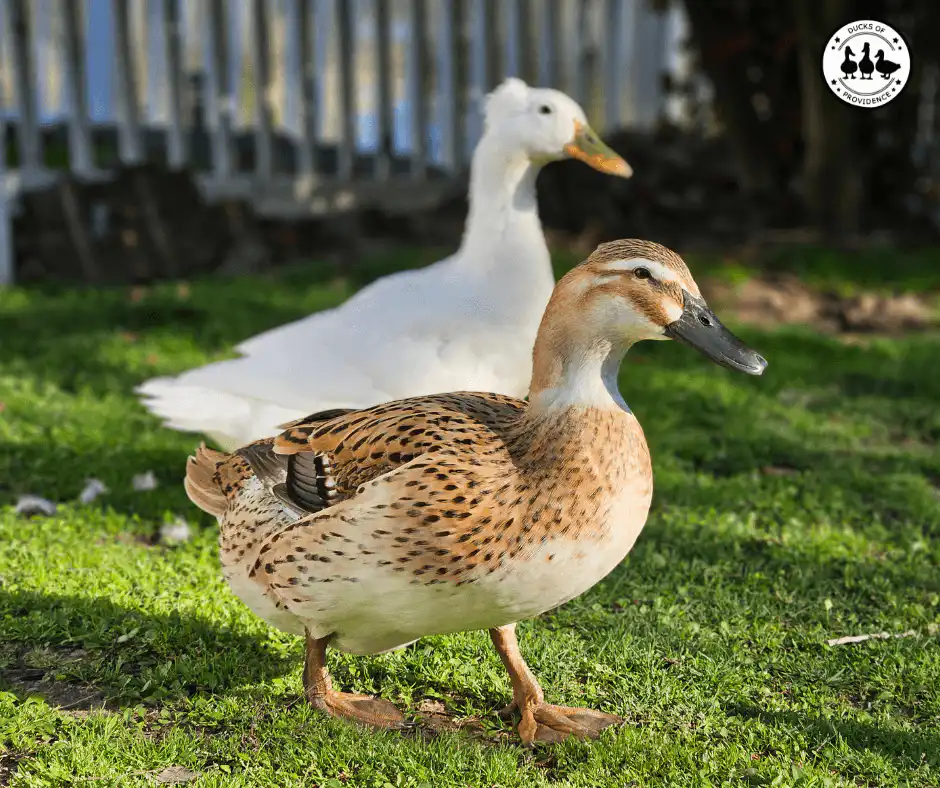
Free-Ranging Ducks: The Pros and Cons of Letting Your Flock Roam Freely
Last updated: February 19th, 2026
Free ranging ducks is one of the most debated topics in backyard duck keeping. Watching ducks roam freely, forage for insects, and explore natural terrain feels instinctively right. It mirrors how wild waterfowl live. But domestic ducks face very different risks than their wild counterparts.
While free ranging can provide enrichment, exercise, and access to natural forage, it also introduces significant variables. Predators, biosecurity concerns, toxic plants, neighborhood hazards, and local regulations all influence whether free ranging is truly safe.
Many duck parents ask:
Is it safe to let my ducks free range?
Do ducks need to roam to be happy?
How do I balance enrichment with predator protection?
The answer is rarely simple. Free ranging is not inherently right or wrong. It is a management decision that should be based on risk assessment, infrastructure, and your flock’s specific needs.
Let’s examine the facts so you can make an informed choice.
Ducks of Providence is free, thanks to reader support! Ads and affiliate links help us cover costs—if you shop through our links, we may earn a small commission at no extra cost to you. Thanks for helping keep our content free and our ducks happy! 🦆 Learn more
Part of the Housing & Environment Hub, Engineering safe, bio-appropriate habitats for backyard flocks.
Pros of Free-Ranging Ducks
There’s something magical about watching ducks free-ranging. Whether they’re exploring the yard, flapping their wings in joy, or splashing around in a puddle, you can almost feel their happiness radiate! But beyond the visible delight, there are real health benefits to letting your ducks roam freely. Free-ranging helps promote both physical and mental well-being, leading to healthier and happier ducks overall. Let’s explore why.
- Natural Foraging Behavior
Free-ranging allows ducks to do what they do best: dabble, forage, and explore! Ducks love searching for bugs, snails, grass, and weeds. This natural behavior not only keeps them entertained but also enriches their diet with protein-rich insects and fresh greens, which can reduce your feed costs. - Healthier and Happier Ducks
Ducks that can roam around tend to be healthier and happier. The exercise they get while free-ranging keeps them fit and prevents boredom, which can reduce behavioral issues like feather picking. Ducks are social, curious creatures, and the variety in their environment keeps them mentally stimulated. - Pest Control
If you’ve got a garden, free-ranging ducks can be fantastic helpers! They’ll happily eat slugs, grubs, and other garden pests, making them a natural form of pest control. However, be warned: they can also munch on your veggies if given a chance! - Reduced Feed Costs
Ducks that have access to a wide area to forage may eat less commercial feed since they’re supplementing their diet with whatever goodies they find. Over time, this can translate to significant savings, especially if you have a large flock. - Fertilizing Your Yard
Ducks naturally fertilize the ground as they wander around, leaving nutrient-rich droppings that can help improve soil health. If managed properly, this can be a boon for your lawn or garden.
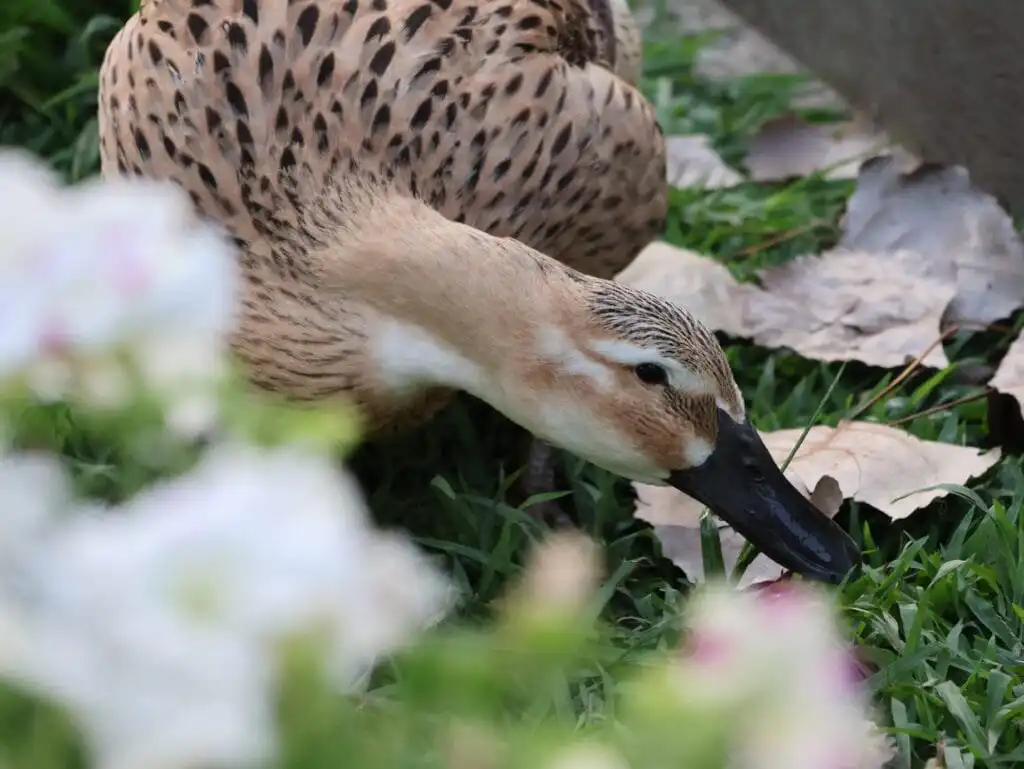
Now, let’s take a closer look at these benefits to understand why free-ranging can be such a game-changer for your flock’s well-being.
Natural Foraging Behavior: Letting Ducks Be Ducks
One of the biggest advantages of free-ranging ducks is allowing them to engage in their instinctive behaviors. Ducks are natural foragers, and when given the opportunity, they can spend hours dabbling, exploring, and foraging in the grass, soil, or shallow water sources. Free-ranging gives them the space to truly express these behaviors, which is not only fulfilling for them but also brings a host of benefits.
A Richer, More Balanced Diet
When ducks are free-ranging, they can hunt for all sorts of delicious morsels like bugs, worms, snails, and small amphibians. These protein-rich snacks are an excellent supplement to their diet, providing nutrients that may not be present in commercial feeds. For example, earthworms and insects are high in protein and healthy fats, while snails and slugs are natural sources of calcium. By diversifying their food intake, free-ranging ducks often have shinier feathers, better muscle tone, and more robust immune systems.
➡️ Learn more about the nutritional needs of ducks
Additionally, ducks naturally graze on grass, clover, dandelions, and other greens they encounter. This fresh vegetation is a fantastic source of vitamins and minerals, especially during the spring and summer months when plants are most nutrient-dense. Free-ranging ducks can even help themselves with medicinal herbs like plantain and dandelion, which are known for their health benefits.
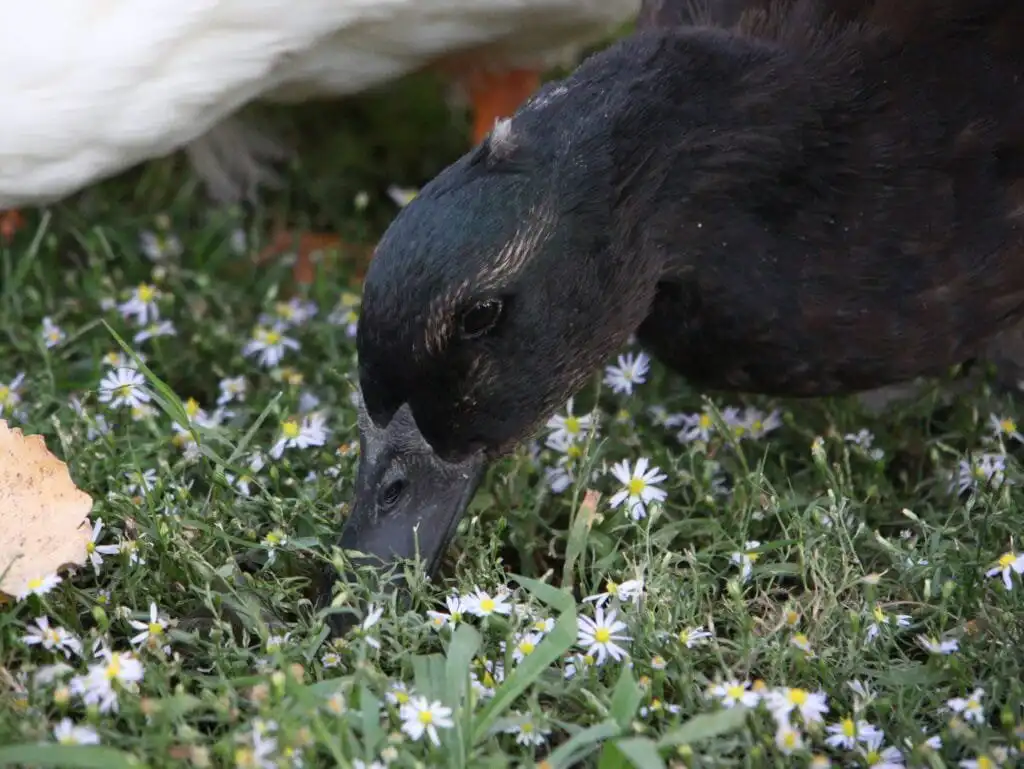
Supports Mental Stimulation and Enrichment
Let’s be honest, ducks are curious little explorers! Allowing them to roam freely means they get to investigate every nook and cranny, which provides essential mental stimulation and keeps them engaged. In the wild, ducks are constantly foraging, so enabling your domesticated ducks to do the same in your yard helps satisfy their natural instincts. It’s fascinating to watch them gently probe the ground, turn over leaves, or sift through mud in search of hidden goodies. Not only does this natural exploration keep ducks active and healthy, but it also helps prevent boredom, a common issue in confined spaces that can lead to negative behaviors like feather-picking or excessive quacking.
A free-ranging environment is essentially a playground for ducks, full of new discoveries like bugs to catch, puddles to splash in, and leaves to nibble on. This constant novelty provides mental enrichment that keeps their minds active and happy. Foraging, interacting with different textures (like grass, soil, and water), and exploring hidden corners of the yard all stimulate their curiosity and prevent the neurotic behaviors that can arise from confinement. In short, free-ranging not only entertains your ducks but also helps them stay both physically fit and mentally fulfilled.
Supporting Natural Pest Control
Another huge perk of free-ranging is pest control. Ducks are incredibly efficient at finding and eating pests that might otherwise plague your garden. Unlike chickens, which can be rough on plants with their scratching, ducks are gentle dabblers. They’ll happily eat slugs, snails, beetles, and grubs without disturbing the roots of your plants. This makes them ideal companions for gardeners looking to keep their greens safe from pests.
During mosquito season, ducks are particularly helpful. They can scoop up mosquito larvae from puddles and standing water, reducing the mosquito population around your property. Plus, they’re fantastic at keeping flies and other bothersome insects in check.
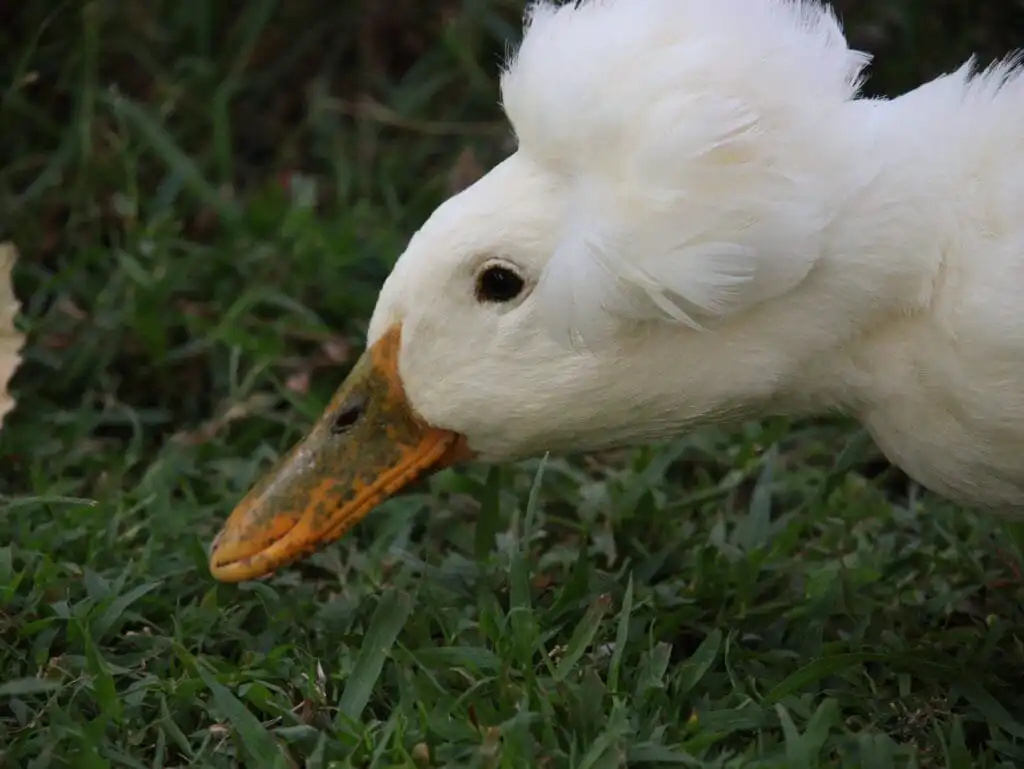
Promotes Physical Fitness and Overall Health
Free-ranging is like nature’s gym for ducks. When given the freedom to wander, ducks are naturally inclined to walk, waddle, and even run across larger areas. This level of activity keeps their muscles toned and their joints flexible, which is especially important for heavier breeds like Pekins or Rouens, who can be prone to leg issues if they become overweight. Regular exercise also helps prevent obesity-related problems, such as fatty liver disease, which can be common in ducks with limited movement.
Beyond keeping their muscles strong, free-ranging helps boost cardiovascular health. Ducks that are more active generally have better circulation, which can contribute to longer, healthier lives. If you’ve ever seen ducks get excited and start flapping their wings or taking short flights across the yard, that burst of energy is doing wonders for their heart health!
Supporting Environmental Balance
By allowing your ducks to free-range, you’re also contributing to the health of your local ecosystem. Ducks can help control invasive insect species and keep pest populations in check. Their droppings naturally fertilize the ground, enriching the soil with essential nutrients like nitrogen and phosphorus. Over time, this can improve soil quality and even enhance the growth of grasses and plants in your yard.
In short, allowing your ducks to forage naturally gives them the freedom to engage in their favorite activities, keeps them healthier, and brings a bit of nature’s balance to your backyard. Of course, it’s essential to ensure they’re free-ranging in a safe environment where they’re protected from predators and dangerous plants or objects. But with the right precautions in place, free-ranging can be one of the most enriching experiences for your ducks, and for you as their caretaker!
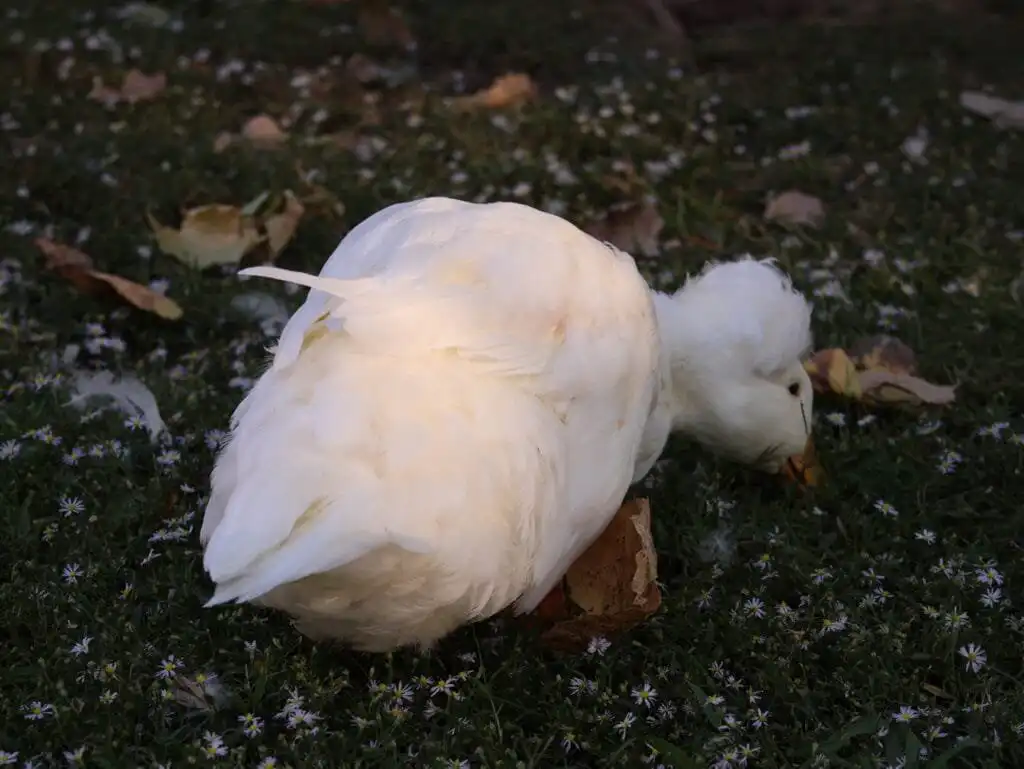
Improves Feather Condition
Believe it or not, free-ranging can actually enhance the condition of your ducks’ feathers. Ducks that roam outdoors have access to sunshine, which helps them absorb Vitamin D. This vitamin is crucial for healthy feather growth and overall well-being. The natural oils produced by a duck’s preen gland are also better distributed when they’re more active, resulting in shinier, waterproof feathers.
Moreover, free-ranging ducks that get to splash around in natural puddles or ponds can keep their feathers cleaner and better maintained than those restricted to smaller, artificial water sources. They’ll spend hours grooming and preening themselves, which keeps their feathers in top shape and helps maintain their insulation and waterproofing.
Reduces Stress and Boredom
Let’s face it: ducks are curious, social, and energetic creatures. If they’re kept confined to a small space, they can easily become bored and frustrated. This can lead to stress, which may manifest in various ways, such as excessive quacking, feather-picking, or aggression toward flock mates. Ducks need mental stimulation to stay content, and free-ranging provides endless opportunities for them to explore, interact with their environment, and engage in natural behaviors.
When ducks are free-ranging, they have the freedom to choose how they spend their time. Whether they’re nibbling on grass, taking a refreshing dust bath, or socializing with their flock mates, they’re in control of their activities. This autonomy is key to reducing stress levels and promoting overall happiness. Ducks that can freely roam often exhibit more relaxed and friendly behavior compared to those kept in confined areas.
Encourages Social Interaction
Free-ranging not only benefits individual ducks but also strengthens the dynamics of the entire flock. Ducks are naturally social animals, and allowing them to roam together can enhance their social bonds. In a free-range setting, ducks have the space to express their natural pecking order without feeling crowded, which can reduce tension and aggression within the flock.
The larger, open environment also gives more submissive ducks the chance to distance themselves if they’re feeling overwhelmed by more dominant flock members. This can prevent bullying and injuries that might occur in a confined run. Plus, the shared experience of exploring new areas together strengthens flock cohesion and can even encourage synchronized behaviors, like foraging or preening side by side.
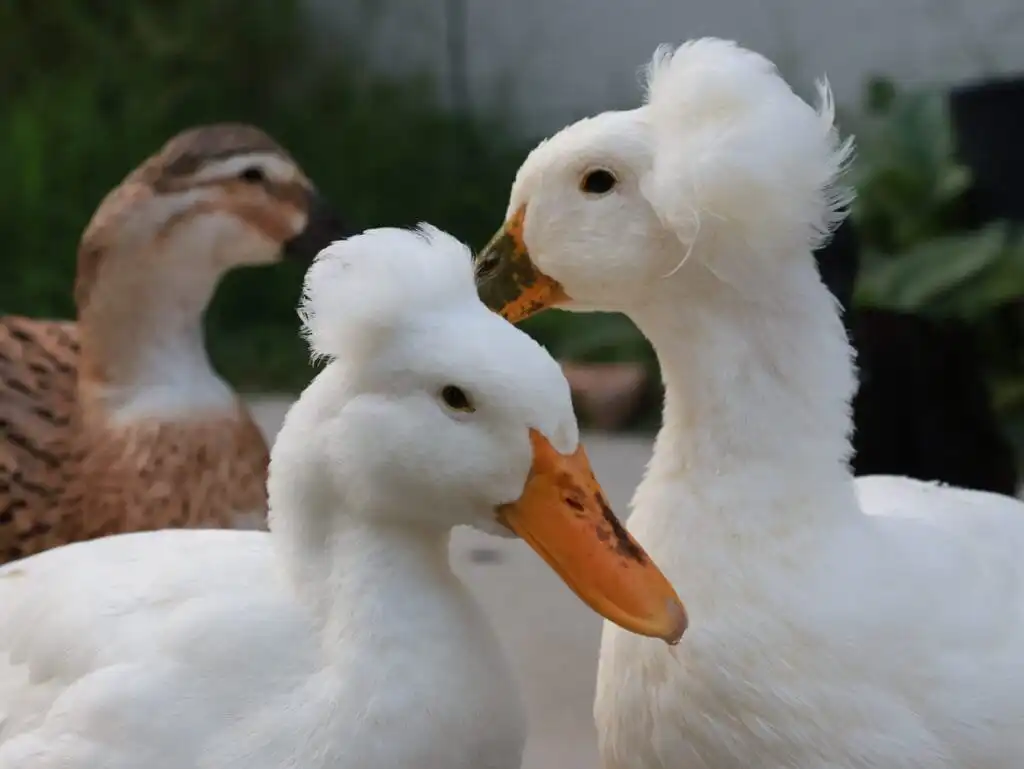
Natural Sunlight Exposure
Ducks benefit tremendously from exposure to natural sunlight. Just like humans, ducks need sunlight to produce Vitamin D, which is crucial for calcium absorption. This is especially important for egg-laying ducks, as calcium is necessary for strong eggshells. Ducks that free-range and bask in the sun are often healthier and produce better-quality eggs compared to those kept solely indoors or in shaded runs.
Additionally, sunlight exposure helps ducks maintain a healthy circadian rhythm, which can regulate their sleep patterns, egg-laying schedules, and overall mood. Natural sunlight also has disinfecting properties, which can help reduce the presence of bacteria or parasites that might otherwise thrive in enclosed, damp environments.
Conclusion: A Happy Duck Is a Healthy Duck
Free-ranging provides an opportunity for your ducks to live their best lives, expressing natural behaviors that contribute to their physical and mental well-being. Of course, the benefits of free-ranging need to be weighed against the potential risks, especially if you live in an area with predators. However, with proper precautions, like supervising your flock, providing safe retreats, and using protective fencing, you can give your ducks the joy of free-ranging while keeping them safe.
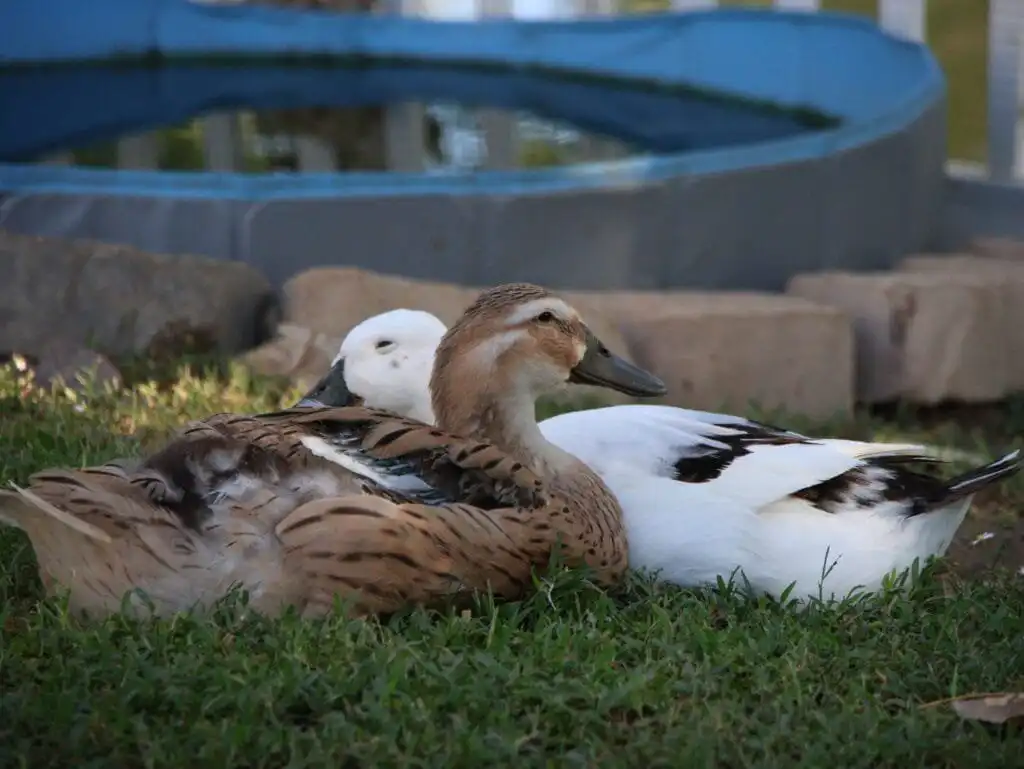
In the end, a happy, healthy duck is one that’s allowed to be, well…a duck! And isn’t that what we all want for our feathered friends?
Cons of Free-Ranging Ducks
While free-ranging offers many benefits, it’s not without its challenges. Let’s explore the potential drawbacks to ensure you’re fully prepared before letting your ducks roam freely.
- Predator Risks
Unfortunately, the biggest downside of free-ranging is the risk of predators. Ducks are vulnerable to a wide range of predators, from hawks and raccoons to foxes and neighborhood dogs. Even in urban areas, there’s always a risk of something lurking that would love a duck dinner. Unless you’re able to supervise them, it can be hard to protect free-ranging ducks from sudden attacks. - Potential for Wandering Off
Ducks are adventurous and may wander further than you’d like—especially if they find a neighbor’s pond more appealing than their own! Some breeds are known to be more prone to roaming, which means they could get lost or find themselves in dangerous situations. - Damage to Gardens and Landscaping
While ducks are excellent foragers, they don’t discriminate between weeds and your carefully planted flower beds or vegetable patches. Ducks can quickly turn a lush garden into a trampled mess if left to their own devices. - Poop Everywhere!
Ducks are prolific poopers, and when they free-range, they’ll leave droppings wherever they roam. If you’re picky about a clean porch or patio, free-ranging might drive you quackers! Plus, if they have access to ponds or pools, their droppings can quickly turn clean water murky. - The Risk of Escaping or Getting Stuck
Ducks are curious, and their explorations can lead them into tricky spots, like getting stuck in fences, under decks, or in neighbor’s yards. Without proper fencing, you may find yourself spending quite a bit of time rounding them up.
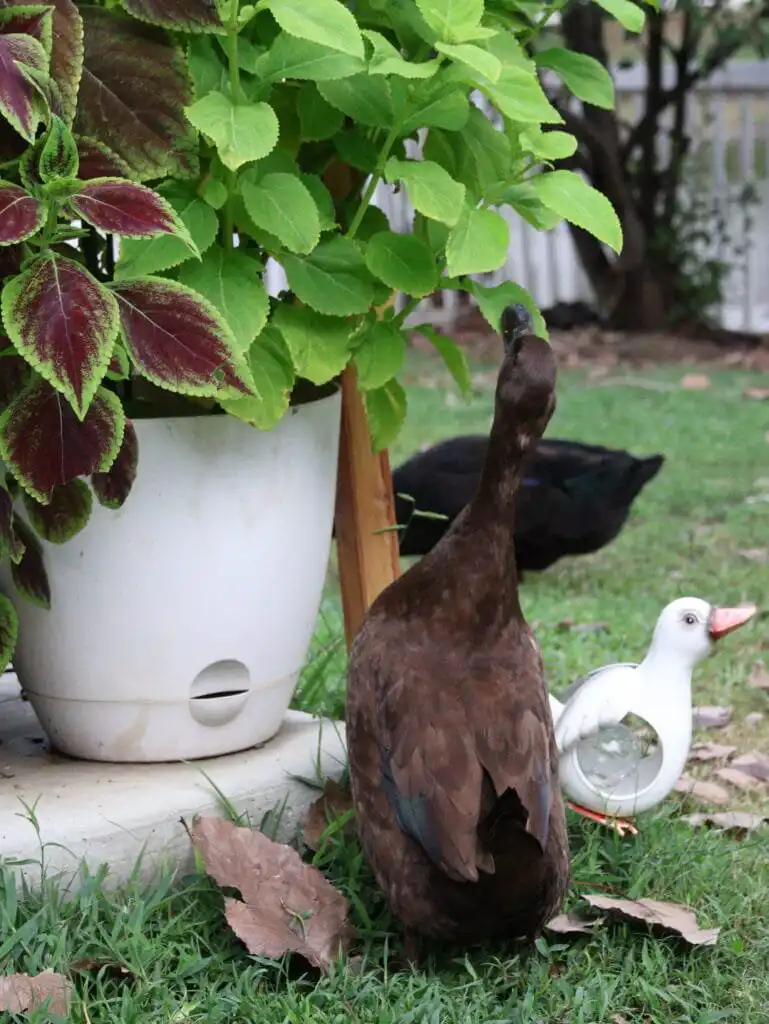
With that in mind, let’s delve into the specific challenges you might face when free-ranging your ducks so you can make the best decision for your flock’s safety and well-being.
The Drawbacks of Free-Ranging Ducks: Understanding the Risks
While the idea of letting your ducks roam freely can be rewarding, it does come with some significant challenges. It’s essential to weigh these potential downsides against the benefits to decide whether free-ranging is the best option for your flock. Here are the main drawbacks you may encounter when free-ranging ducks:
Vulnerability to Predators
One of the biggest risks of free-ranging is the increased exposure to predators. Ducks are naturally vulnerable, especially to ground predators like foxes, raccoons, and coyotes, as well as aerial threats such as hawks and owls. Free-ranging ducks lack the protection of a secure run, making it easier for predators to attack, especially if your flock isn’t supervised. Even during the daytime, many predators are opportunistic and can strike quickly, leaving little time to react.
➡️ Learn more about duck predators
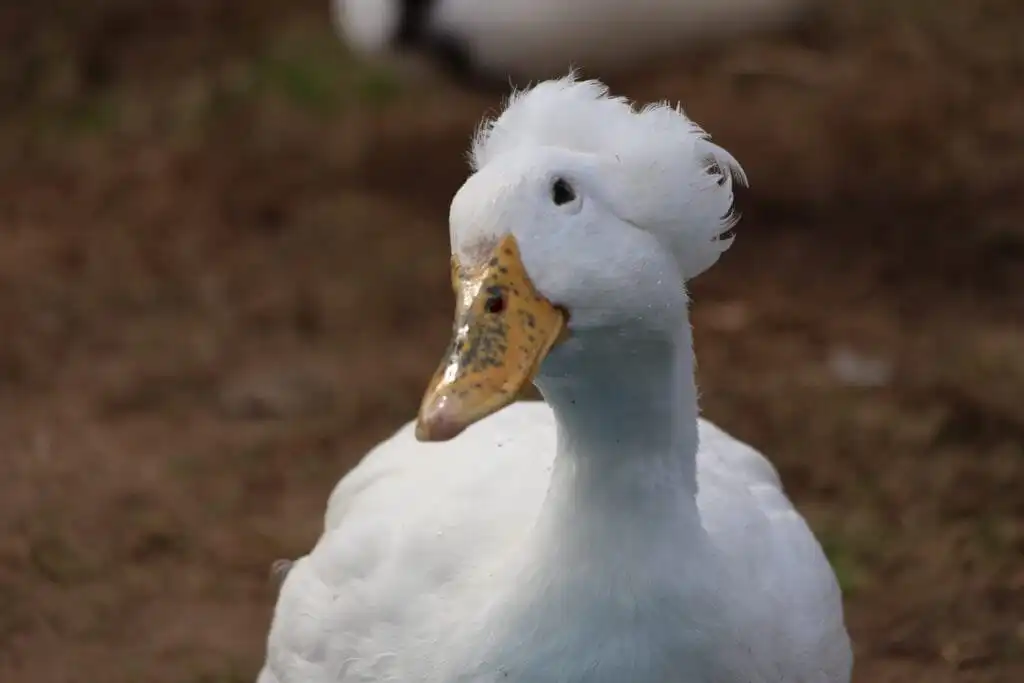
To minimize this risk, you may need to invest in protective measures like fencing, netting, or employing guardian animals like dogs. However, even with these precautions, there’s no guarantee that a determined predator won’t find a way in.
➡️ Learn more about predator proofing
Potential for Ducks to Wander Off
Ducks are naturally curious, and while this trait is adorable, it can also mean they might wander far beyond the safety of your yard. A gap in a fence or an open gate can lead them on an unplanned adventure, and you may find yourself chasing your feathered friends down the street! If you live near a busy road, this can be especially dangerous.
Additionally, ducks that wander too far from home are at a higher risk of getting lost, encountering predators, or being exposed to hazardous substances, like chemicals in neighbors’ yards.
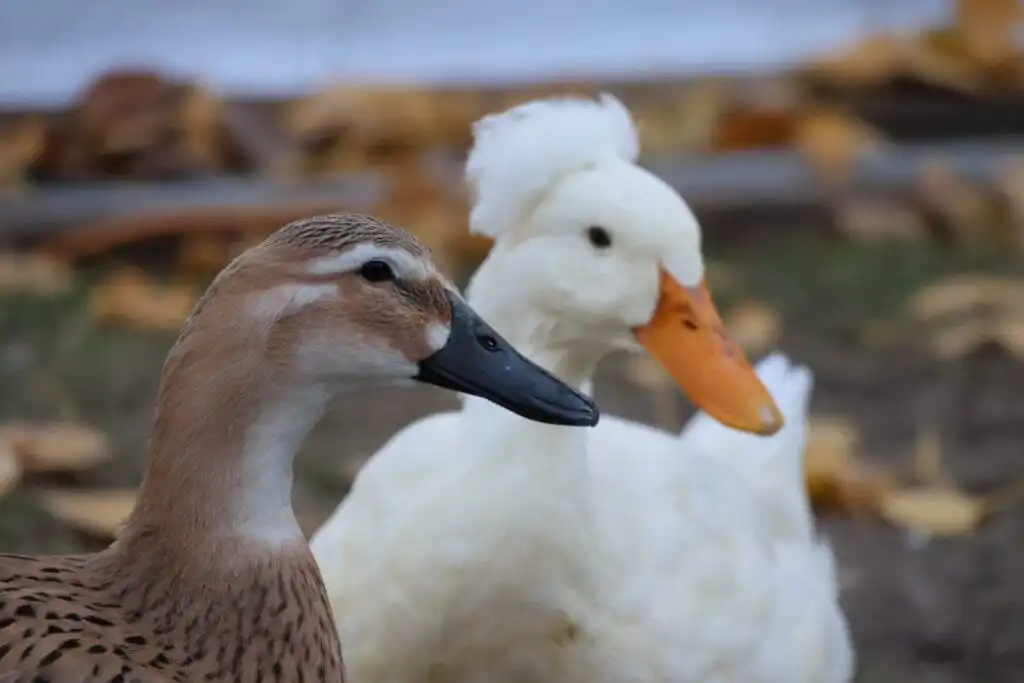
Increased Risk of Injuries and Accidents
The great outdoors presents many hidden dangers, from sharp objects like broken glass or nails to entanglement hazards like garden netting or wire fencing. Free-ranging ducks can easily injure their feet, especially if they step on something sharp or get caught in an obstacle. Larger, heavier breeds like Pekins are particularly prone to leg injuries if they’re moving over uneven terrain.
Additionally, ducks are often attracted to shiny objects or unfamiliar plants, which could lead to the ingestion of foreign items or toxic plants that can cause health issues.
Exposure to Diseases and Parasites
Free-ranging ducks are exposed to a variety of environmental factors, including pathogens and parasites carried by wild birds, rodents, or other animals. Water sources, such as ponds or streams, can harbor bacteria like Salmonella or botulism, which may cause severe illness in ducks. Wild birds can also spread parasites like lice, mites, or worms, increasing the risk of your flock contracting diseases.
Maintaining proper biosecurity can be challenging with free-ranging ducks, as it’s harder to control their environment and interactions with other wildlife. Regular health checks and preventive measures, such as deworming and vaccinations, become even more crucial if your ducks are free-ranging.
Damage to Gardens and Landscapes
Ducks are natural foragers, which means they’ll happily munch on plants, dig through mulch, and uproot delicate flowers in search of bugs or tasty greens. While this behavior is great for pest control, it can be a nightmare if you have a carefully maintained garden. Free-ranging ducks may turn your flower beds into a muddy mess or strip your vegetable garden of its leafy greens.
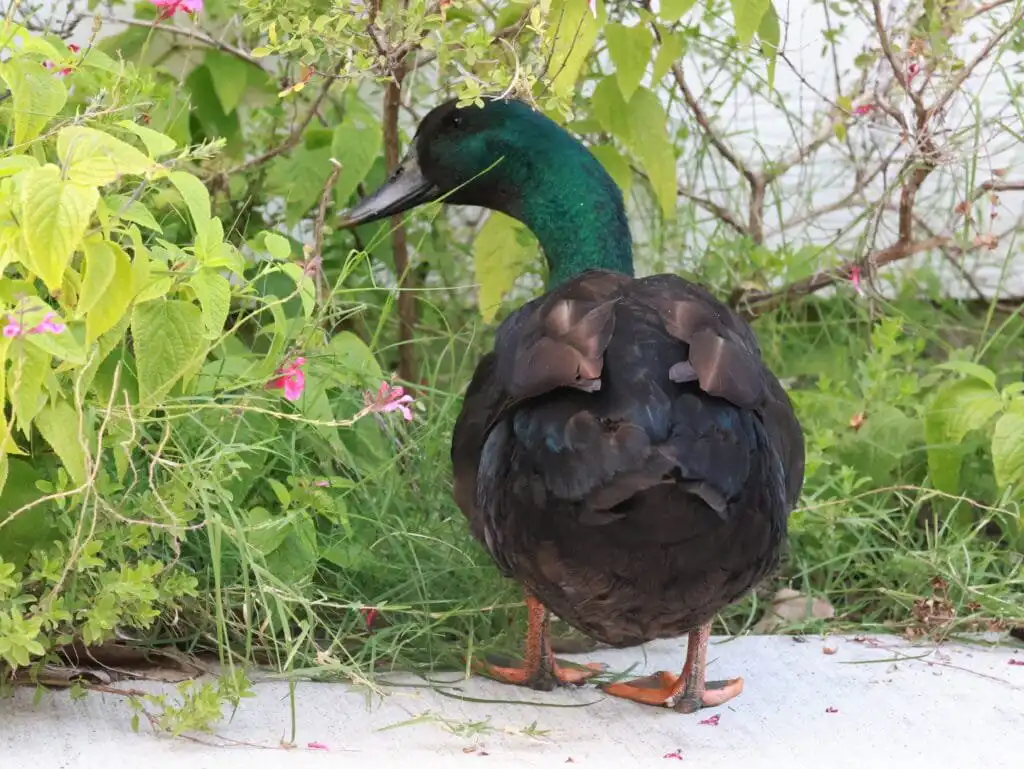
To protect your garden, you may need to install barriers or designate specific areas where your ducks can roam. However, if they’re particularly determined, ducks can sometimes find a way to sneak into restricted areas, leaving a trail of destruction in their wake!
Difficulty in Managing Egg-laying
When ducks free-range, they have the freedom to lay their eggs wherever they please. This can make egg collection a bit like an Easter egg hunt! Ducks often choose secluded spots to lay their eggs, and if you’re not paying close attention, you might miss out on their hidden nests. Not only does this make collecting eggs more time-consuming, but it can also lead to spoiled eggs if they’re left undiscovered for too long, especially in hot or cold weather.
Additionally, if your ducks lay eggs in an unsecured location, those eggs may be stolen by predators, rodents, or other wildlife, leading to a decrease in your overall egg yield.
Mess and Manure Management
While ducks can be great at controlling pests and fertilizing your lawn, free-ranging also means they’ll be leaving droppings everywhere. Unlike chickens, ducks tend to be a bit messier, especially if there are water sources nearby where they can splash and make mud. If your ducks free-range on a lawn or patio, you’ll quickly notice droppings accumulating, which can be unsightly and unsanitary.
Managing the mess can require more frequent yard maintenance, especially if you have family members or pets who share the outdoor space. You may need to hose down hard surfaces regularly and use shovels or rakes to clean up manure from grassy areas.
Weather and Seasonal Limitations
Free-ranging is much easier in fair weather, but extreme conditions can pose a risk to your ducks. In cold climates, ducks can get frostbite on their feet if they’re left to roam on frozen ground for too long. In hot weather, free-ranging ducks are at risk of overheating if they don’t have access to shaded areas or water to cool off.
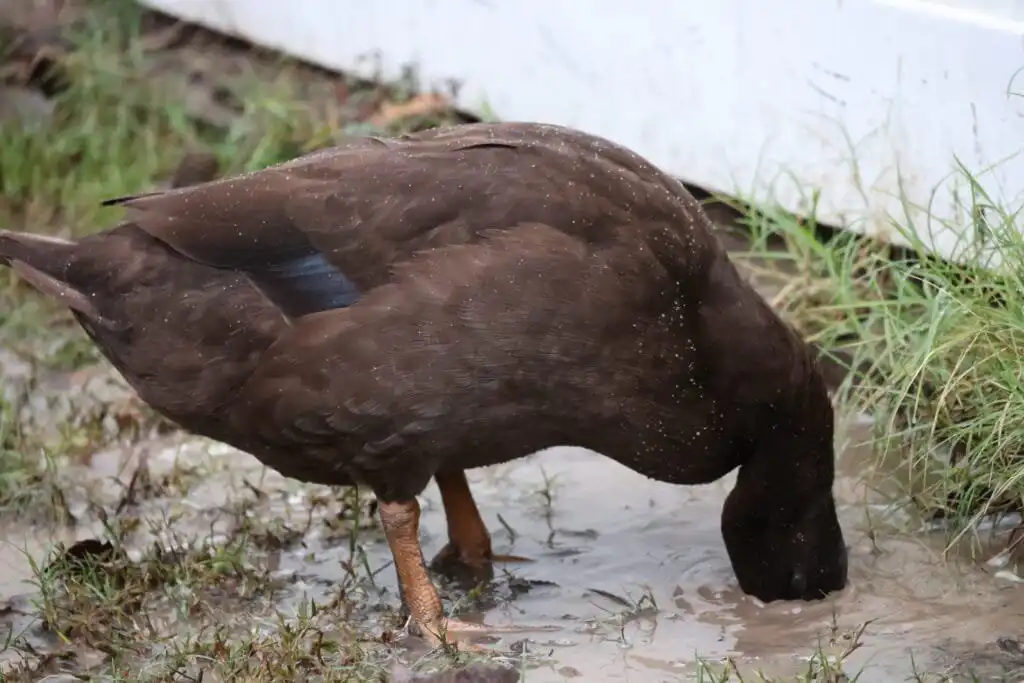
Additionally, wet or muddy conditions can increase the risk of foot injuries, especially if ducks are walking on uneven or rough surfaces. To prevent this, it’s important to provide safe, dry areas where your ducks can rest, particularly during wet or muddy seasons.
Tips for Free-Ranging Ducks Safely
If you decide to let your ducks free-range, here are some tips to keep them as safe as possible:
1. Provide a Secure Shelter
Ensure your ducks have a safe place to retreat to at night, as most predator attacks happen after dark. A secure coop with predator-proof latches is essential to protect them when they are not supervised.
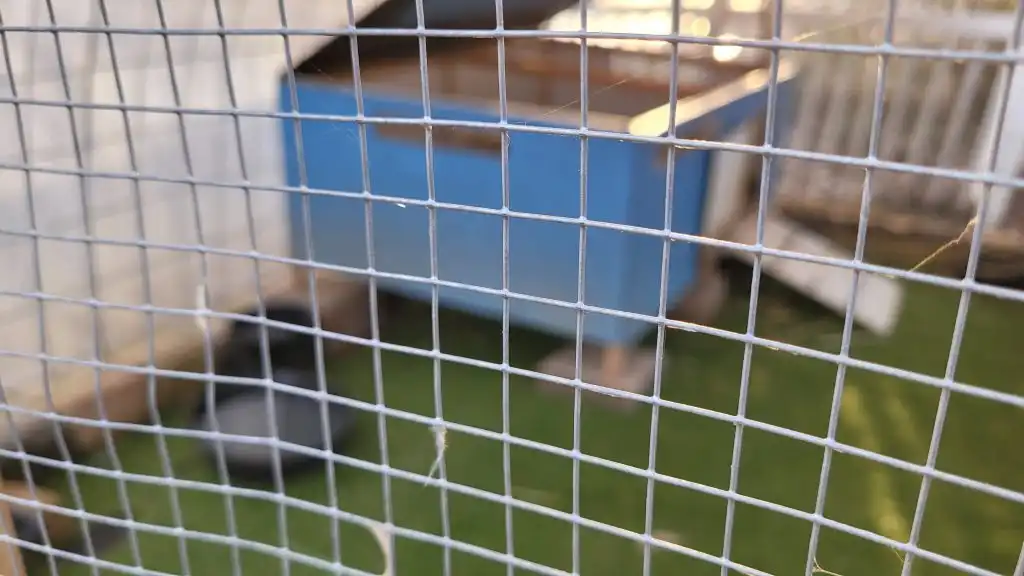
🛒 Product recommendation: Consider a durable duck coop with reinforced metal wire and secure doors, such as this walk-in duck coop with a predator-proof design. It’s spacious and provides plenty of room for your ducks to rest safely at night.
2. Add Netting to Secure from Aerial Predators
If you’re concerned about aerial predators like hawks or eagles, adding netting over your free-range area is crucial. A strong netting system can protect your ducks from above while they forage freely on the ground.
🛒 Product recommendation: Install bird netting or aviary netting like this heavy-duty mesh netting, which can be draped over your free-range area to safeguard against aerial predators. It’s easy to install and provides essential protection without obstructing your ducks’ access to their environment.
3. Supervise When Possible
If you’re around, try to let them free-range under your supervision. Not only does this reduce the risk of predators, but it’s also a lot of fun to watch your ducks explore!
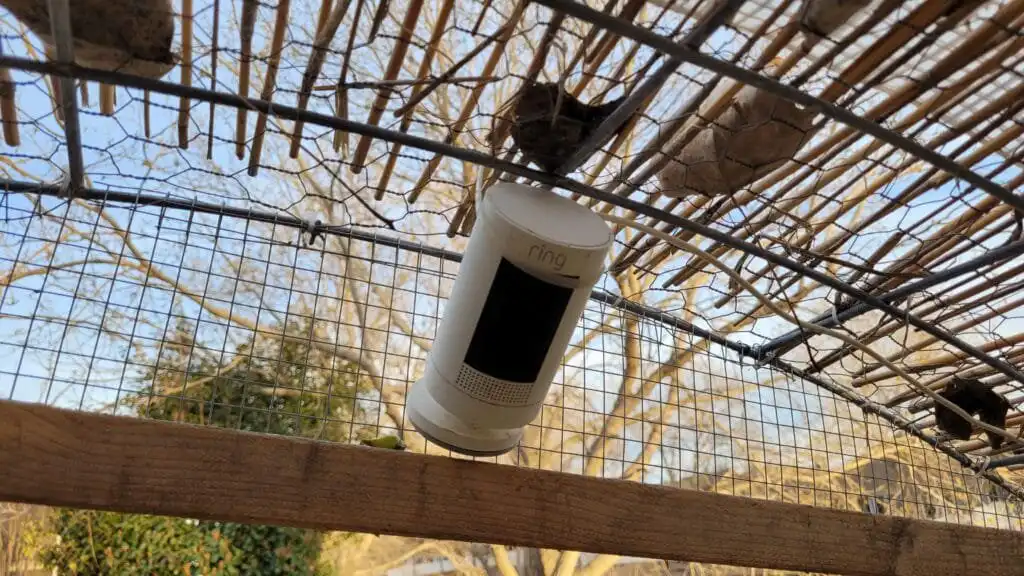
🛒 Product recommendation: To make supervision easier, consider using a wildlife camera like the motion-activated camera to keep an eye on your ducks while you’re indoors or busy.
4. Provide Cover
Hawks and other birds of prey are a real threat, especially if you live in an area with wide-open spaces. Planting shrubs, trees, or providing shelters can give your ducks places to hide if they sense danger.
🛒 Product recommendation: Create a natural cover with outdoor shrubbery or duck hideouts, such as the duck shelter hut designed to blend into your yard while giving ducks a safe place to hide.
5. Train Your Ducks
If your ducks are used to being herded back to their coop with treats, it’s much easier to get them in at night. A little training can go a long way in ensuring they come home safely.
🛒 Product recommendation: Use a treat dispenser like the foraging toy to encourage your ducks to follow you back to their coop. These toys are a fun way to reinforce their training and reward them for coming inside safely.
By following these tips and using the right products, you can provide your ducks with a safe, enriching free-range experience while ensuring their well-being!
Our Approach to Free-Ranging: Supervised Adventures for a Safe and Happy Flock
In our household, we’ve found a balance that works perfectly for both our ducks’ safety and their need for exploration: supervised free-range time. Our ducks are not just poultry, they are beloved pets, and to us, they are far too vulnerable to be left unsupervised in the yard. That’s why we make sure their free-ranging adventures happen only when we can be out there with them.
I genuinely enjoy these moments with my flock. There’s something so peaceful about spending time in the yard, watching them waddle around, hunt for bugs, and explore to their hearts’ content. It’s a special time for us to bond, and it’s always fun to see their personalities shine as they forage, splash, and investigate every corner of the yard.
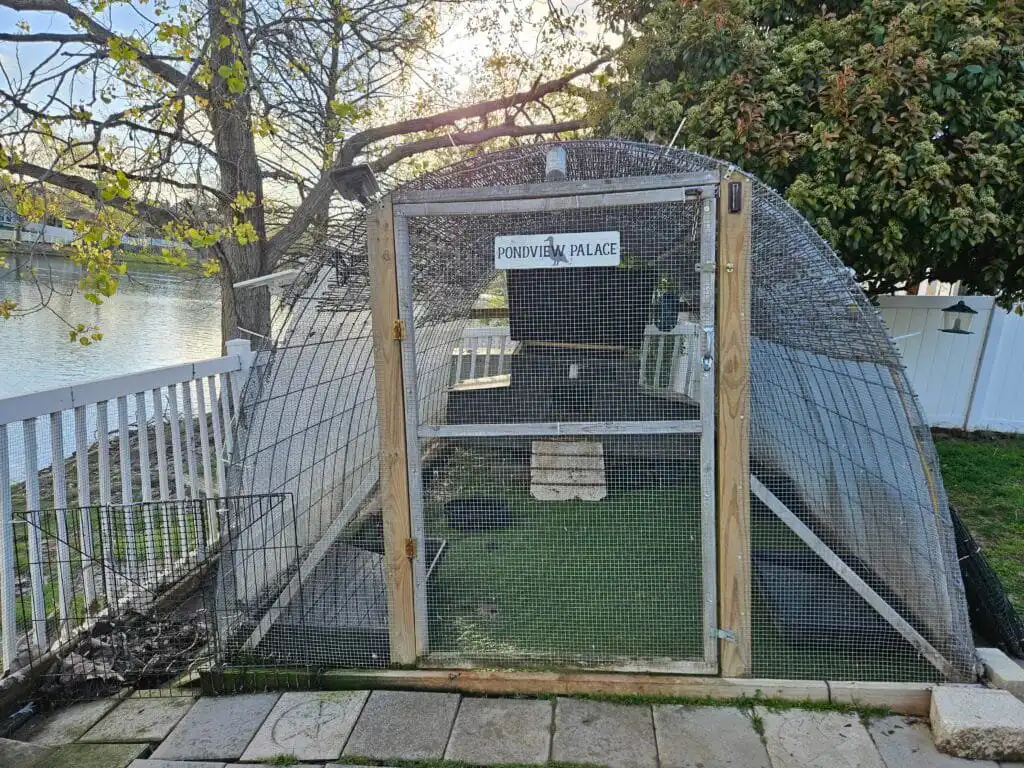
When we’re not outside together, the ducks stay safely in their secure run, which is designed to protect them from predators and other hazards. This setup gives me peace of mind, knowing they’re safe when I can’t be with them while still giving them the opportunity to experience the joys of free-ranging when we’re together. It’s the perfect compromise for keeping our feathered friends happy, healthy, and, most importantly, safe.
Is Free-Ranging Right for Your Ducks?
Deciding whether to free-range your ducks is a personal choice that depends on your unique circumstances. If you live in a relatively predator-free area, have a secure yard, or can supervise them during the day, free-ranging could be a great option. However, if predators are a constant concern or you’re worried about your ducks wandering off, a fully enclosed run may be the safer route.
At the end of the day, happy ducks are healthy ducks, whether they’re free-ranging or in a cozy, enclosed space. Let your flock’s safety and well-being guide your decision, and you’ll have a quacking good time either way!
Have you tried free-ranging your ducks? What has been your experience? Let me know in the comments below, I’d love to hear your stories!
Related Content you may enjoy:
- 17 Duck Predators – Common And Not-So-Common Ones
- How to keep your ducks safe from predators?
- Toxic Plants for Ducks: What You Need to Know
- Building a Hoop Coop for Ducks with Cattle Panels
- How to Build a Predator-Proof Duck Run: A Step-by-Step DIY Guide
- 16 Common Duck Health Conditions You Should Know About
- How to Conduct a Duck Health Check: A Comprehensive Guide
- Understanding Metal Poisoning in Ducks: Causes, Symptoms, and Prevention
Is your habitat optimized for safety? Return to the Habitat Guide for more research on predator-proofing and sanctuary design.
